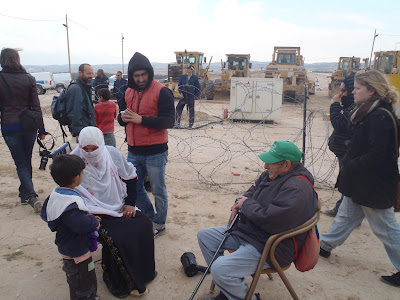My earlier two posts were about our time in At-Tuwani village. The following is a CPT release which I received by email yesterday... the stabbing occurred two days after we were there.
CPT article:
Palestinian man stabbed by settler in Tuwani days after settler riot
disrupts replanting of damaged olive trees
March 22, 2011
At-Tuwani, West Bank
On the morning of March 21st shortly after 7 am a Palestinian father
of two from Tuba village was attacked and stabbed near the the illegal
outpost of Havat Ma'on in the South Hebron Hills.
Mahmoud Ibrahim Ali
Awad, 32, was traveling by donkey from his home in Tuba to a medical
appointment in the city of Yatta when a masked settler ran out of the
illegal outpost of Havat Ma'on and attacked him with a knife. The
assault was witnessed by a resident of Tuwani, who quickly called
villagers and internationals and interrupted the attack. The
assailant ran back into the illegal outpost of Havat Ma'on. Villagers
recognized him as a settler who was involved in a riot in the village
earlier that week.
Awad was transported by ambulance to Alia Hospital
in Hebron and remains there with stab wounds to his chest and right
arm.
Two days earlier on March 19 settlers from the illegal outpost of
Havat Ma'on rioted near Tuwani in response to the planting of 25 olive
trees in Palestinian olive groves there. Israeli peace activists and
internationals had joined with villagers to replace mature olive trees
which were hacked and destroyed in the grove earlier this month.
Shortly after 9 am on the 19th approximately 25 settlers emerged
from the illegal outpost of Havat Ma'on and moved among Palestinians
who were grazing sheep and collecting herbs near the olive groves in
Humra valley and in nearby Khoruba valley and on Khoruba hill.
The
settlers, several of whom were masked, shoved and kicked the villagers
and their sheep and also internationals and Israeli peace activists
who had come to assist in replanting the damaged olive trees.
Israeli soldiers and border police declared the area a closed military
zone and discharged two percussion grenades in an attempt to force
villagers to leave the area.
Two Palestinian men were arrested and one
elderly man, Fadil Ahmed Raba'i collapsed from respiratory distress
and lost consciousness after soldiers pushed him to the ground and
forcibly restrained him. Soldiers refused to allow the ambulance
direct access and instead required the driver to take a detour
resulting in a 45 minute wait. Raba'i was transported to a hospital
in the city of Yatta and released later that day. Two Palestinian men
were arrested by border police and remain in custody. Israeli
soldiers and border police did not arrest or detain settlers.
Pictures of the incident are available at:
Sadly, villagers think these events may have been triggered in part by
the recent killing of a settler couple and their children in Itamar
settlement near Nablus. No Palestinians have been charged
and it now appears possible that the murders may have been committed
by Thai workers who were angry because they had not been paid for
their labor. Speaking about the six olive trees found damaged on
March 16, Fadil Ahmed Raba'i stated, "They did this because of the
settlers who were murdered near Nablus."
Palestinians and internationals working in the West Bank have
expressed concern over a recent rise in settler violence. The
situation is further exacerbated by an absence of law enforcement in
the region. According to the Israeli legal rights group Yesh-Din
Israeli settlers are rarely charged with crimes committed against
Palestinians, and if they are their cases are heard in civilian court,
where they are provided with legal safeguards and protections. When
Palestinians are charged their cases are heard in Israeli military
courts, and they do not enjoy the same legal protections.
Additionally it is extremely difficult for Palestinians to gain
redress for crimes committed against them by settlers. According to a
recent report by Yesh-Din, out of 642 monitored investigations of
Palestinian complaints against settlers, 91 percent were closed
without an indictment.
[Note: According to the Geneva Conventions, the International Court of
Justice in the Hague, and numerous United Nations resolutions, all
Israeli settlements in the Occupied Palestinian Territories are
illegal. Most settlement outposts are even considered illegal under
Israeli law.]
And an update on the update - here's a Los Angeles Times story that mentions the stabbing and looks more broadly at the issue of settler attacks:
The request by Palestinians for international protection is exactly the type of work that CPT (and other groups such as ISM and EAPPI) do.
And an update on the update - here's a Los Angeles Times story that mentions the stabbing and looks more broadly at the issue of settler attacks:
The request by Palestinians for international protection is exactly the type of work that CPT (and other groups such as ISM and EAPPI) do.



















